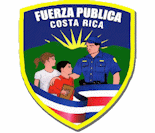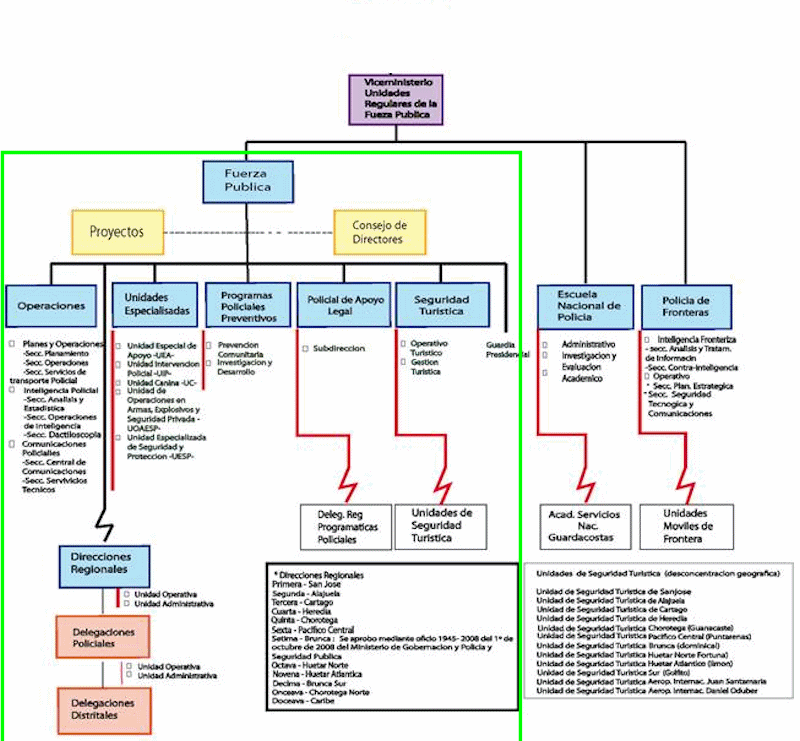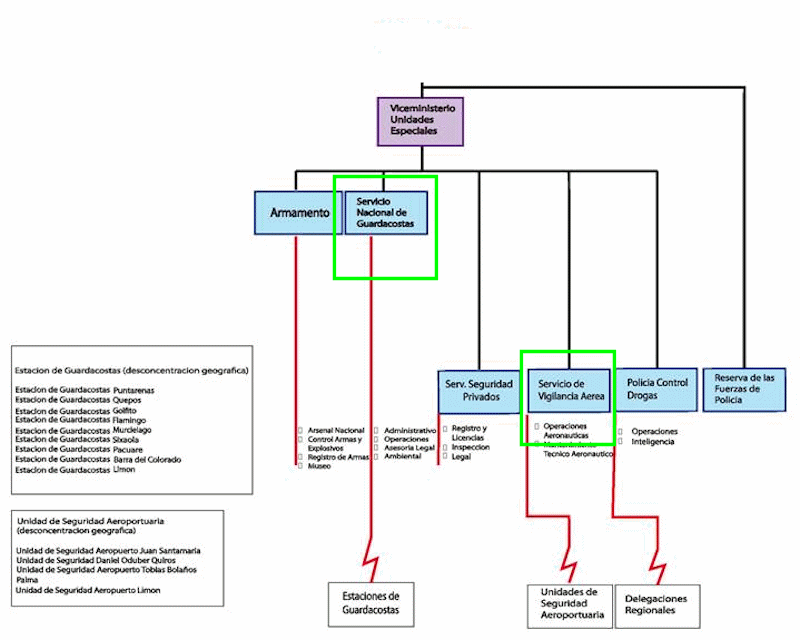Ministerio de Seguridad Pública
Ministry of Public Security
 The Ministry of Public Security is responsible for monitoring, maintaining order public, prevent manifestations of crime and cooperate to suppress, preserve and maintain the sovereignty national, as well as assist in strengthening the rule of law, in accordance with the General Law police, No. 7410, as amended and the Law Organic Security Ministry Public, No. 5482, of December 24, 1973.
The Ministry of Public Security is responsible for monitoring, maintaining order public, prevent manifestations of crime and cooperate to suppress, preserve and maintain the sovereignty national, as well as assist in strengthening the rule of law, in accordance with the General Law police, No. 7410, as amended and the Law Organic Security Ministry Public, No. 5482, of December 24, 1973.
One of the oldest democracies in the region, Costa Rica abolished its army on 1 December 1949 after undergoing a revolution that reformed the nation’s structure. thereafter, internal security became the responsibility of the Civil Guard, which, over the years, transformed itself into today’s Public Security Force, controlled by the Ministry of Public Security and composed of various services, including the Counterdrug Police, national Coast Guard, Public Force Reserve, and, the Servicio de vigilancia Aérea (Air vigilance Service) (SvA) worthy successor to the former Costa Rican air force.
Military terminology and organizational structures do not exist in entities under the authority of the Public Force. According to constitutional mandate), the Public Force’s mission involves preserving internal order in the country. That mandate also delegates to the Public Force the protection of national sovereignty, practically converting them into an army and air force, despite how much these institutions pride themselves on not being such things.
The Civil Guard, the Guardia Rural assistance, the police in charge of Drug Control depend on of the Ministry of security Public, in concordance with the stipulated in article 6 of the law General of police N ° 7410 and their reforms. The Guardia's Rural assistance, the Civil Guard and the border police, as parts of the public force of this Ministry, for safety, public security and maintenance of the order public through patrols by land, act under an only command police, in each region that the Ministry determined in the territory national, of conformity with the skills and powers, given in the General Law of police and its reforms.
While the Ministry of Public Security (MPS) was officially charged with both national and domestic security, there are several institutions that had police-type responsibilities. Within MPS are the Fuerza Publica (or Public Force, uniformed cops numbering around 10,000 total as of 2009); the Drug Control Police (PCD), a rough equivalent to the DEA that was very small with only about 200 officers; the Air Wing with basic Cessna and Piper aircraft, including two helicopters, numbering around 15-20 aircraft with only about half operational at any one time (and only one helicopter, an aging Hughes 500 that the USG donated in the mid-80s, operational at any one time); and a barely capable coast guard with aging 82-foot patrol boats and a couple of dozen or so smaller launches that are often not operational. Maintenance has traditionally been a weak area for Costa Rican security agencies, especially its coast guard.
As crime increased, so had the number of companies offering private security services (and the number of weapons imported to arm them). By 2010 there were more armed private security guards in Costa Rica than there were police officers.
Costa Rica also has tourist police, customs police, transit police, immigration police, and other organizations that have police-like responsibilities. One of the biggest problems confronting these security institutions is their inability to smoothly coordinate amongst themselves.
Ministry of Public Security - History
During the time colonial was made efforts by creating a institution military, but given that the population Costa Rica had needs more urgent, fundamentally socio-economic type, these concerns were relegated. Such situation, coupled to the independence of Costa Rica was achieved without that there fighting with Spain, with the passage of time those facts were reaffirming the pacifist civil vocation of the Costa Rican people.
In 1821, with the enactment of the Concord Pact, there was established two units in the area military, home, economy, police public and political, as well as commands in the villages a charge of an official. In 1842 it was tried of create the obligatory military service, without success. Subsequently, the constituent Assembly of 09 April 1844 created the Constitution of the State, and in article 163, the Ministry of Treasury and War [Hacienda y Guerra]. In 1848 a new Constitution abolished the army for first time.
In 1849 the army revived and, at the same time, the Ministry of Guerra was eliminated , but the Government in turn was deposed by the General Tomás Guardia, who returned to abolish the army. In 1850 the budget of this Ministry was 20% of the budget national [andin 1874 it was 37.4%]. During the second half of the 1850s military forces were mobilized and they organizedon the occasion of the presence in Central America of the American filibuster William Walker and his invading forces, which wanted to seize the country.
In 1908 the Army was subdivided in three bodies: infantry, artillery and cavalry. With the arrival to power in 1907 of Federico Tinoco, After deposing to the President Alfredo González Flores, his regime restructured the Army. In 1923, President Julio Acosta eliminates the Ministry of Guerra, which was replaced by the Ministry of Poblic Security and the activities military went to a second plane. On 13 April 1923 of that same year, through the law number 93, is created the Direction of criminal investigations.
On 01 December of 1948, by Legislative Decree, the army was abolished, but retained the Costa Rican air force. This abolition was ratified by the Assembly Constituent in its article 12 of the Constitution of the Republic of Costa Rica of 1949. To outlaw the army as permanent institution and provided for monitoring and conservation of the order public, the armed forces are called the Civil Guard and this would include functions of Police and of order and security of the nation.
The air section, formerly named air force Costa Rican, was created in 1958.
The Government of Rodrigo Carazo Odio [1978-1982] merged the Ministry of safety public and the Ministry of Governorate and police into one, which is called Ministry of the Interior; However, in subsequent Administration this project did not have the support necessary for continuation. At the same time, the address is created National of the service of surveillance Maritime, with the objective of protecting those resources marine in high sea, Search and rescue, drug trafficking and smuggling.
In 1979 the national school of police was attached to the Ministry of Security public. In 1983, by Decree Executive #14330-S, the name to the School national of police was changed to Francis J. Orlich B. by the of "Academy of the force public Francisco J. Orlich B.", under the authority of the Director General of the Guardia Civil. In 1985 the Academy of the force public Francisco J. Orlich B. is attached to the Ministry of Public safety and refers to as a "National School of" Police Francisco J. Orlich B.
On 26 May 1994, the " "Ley General de Policía" "[law General of police] number 7410, which, for the first time the country had with a body legal that regulated all the police officers in the country. This law first created the police career, which improved the police training, promotion opportunities, the wage conditions and removed the removal of staff with each change of Government, to guarantee the stability of employment of their police forces. It set the Police of borders. The section air [Sección Aérea] changed its name the service of monitoring air [Dirección del Servicio de Vigilancia Aérea] and the name of national's Control of drug changes the name to Drug Control Police (PCD).
In 1995, the guard assistance Rural [Guardia de Asistencia Rural], that always had belonged to the Ministry of Interior and police, was transferred to the Ministry of public security. Subsequently, to middle of that year, the two ministries again had an single minister.
In 2000 the law #8000 created the national service of Coast Guard, which sat the bases of the professionalization of the until that then service of Surveillance maritime
Through law number 8115 of 28 August 2001, is Declared December 1 as the "Day of the abolition of the army". On 23 March 2001, the "law of police Civil law" reformed the General Law of police and, among others advances, police, a unit creates the address of Legal support composed of lawyers policemen, which are in charge of advice to the police officers in their functions.


|
NEWSLETTER
|
| Join the GlobalSecurity.org mailing list |
|
|
|

